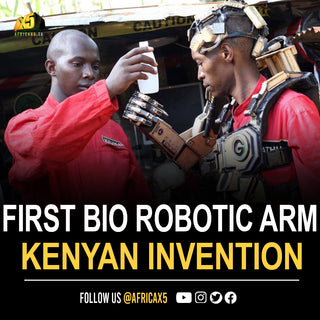David Gathu and Moses Kinyua are inventors from Kenya. While both of them dropped out of college due to financial constraints, it has not stopped them from learning or inventing. Recently, the duo came up with the idea for an electronic prosthetic during the pandemic to assist Kenya with battling the coronavirus. Initially, they thought the prosthetic could be used solely for sanitization efforts. When the virus hit our country, we decided to create a machine that could help us decontaminate surfaces. It can also be used in schools, restaurants, [or] hospitals.
But with their country successfully thwarting the spread of the coronavirus, Gathu and Kinyua decided to repurpose their invention, focusing on helping those who are disabled in Kenya. The reason why we designed this bio-robotic hand is because we wanted to help those people who have lost the use of their limbs, the disabled people. Our aim is to give them something that will help them or will aid them to go into their daily activities to move from a dependent person to an independent person,
Currently, most prosthetic technology is controlled by a person’s muscles. However, this new invention from Gathu and Kinyua is powered solely by brain signals, converting the brain’s messaging into an electric current via a “NeuroNode” biopotential headset receiver. The Neuronode technology was initially invented to support those who have paralysis and/or speech loss.
The Kenyan inventors have repurposed the innovation, allowing the electric current to drive into the robot’s circuitry, giving it mobility. The arm also has several vital materials which enables it to move vertically and horizontally. This innovation could make it possible for those who are disabled to drive cars, operate computers and phones, or switch lights on and off, simply by using their brain.While the invention is a technological supernova, it is still in its prototype phase; Gathu and Kinyua created the bio-robotic prosthetic from salvaged, second-hand electronics.





